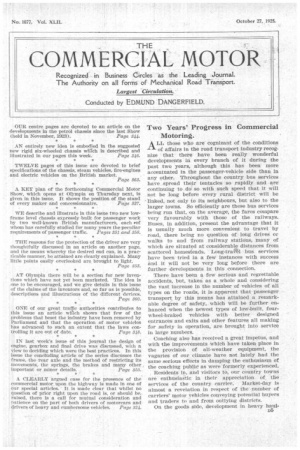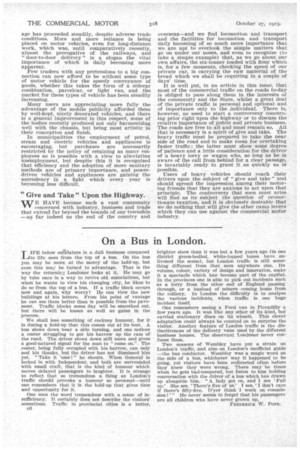Two Years' Progress in Commercial Motoring.
Page 1

Page 2

If you've noticed an error in this article please click here to report it so we can fix it.
ALL those who are cognizant of the conditions of affairs in the road transport industry recognize that there have been really wonderful developments in every branch of it during the past two years, although this has been more accentuated in the passenger-vehicle side than in any other. Throughout the country bus services have spread their tentacles so rapidly and are continuing to do so with such speed that it will not be long before every rural district will be linked, not only to its neighbours, but also to the larger towns. So efficiently are these bus services being run that, on the average, the fares compare very favourably with those of the railways. Buses, in addition, present the advantage that it is usually much more convenient to travel by road, there being no question of long drives or walks to and from railway stations, many of which are situated at considerable distances from scattered homesteads. Long-traAl bus services have been tried in a few instances with success and it will not be very long before there are further developments in this .connection.
There have been a few serious and regrettable accidents, but, taken as a whole and considering the vast increase in the number of vehicles of all types on the roads, it is apparent that passenger transport by this means has attained a remarkable degree of safety, which will be further enhanced when the newest types of low-built, fourwheel-braked vehicles with better designed entrances and exits and other features all making for safety in operation, are brought into service in large numbers.
Coaching also has received a great impetus, and with the improvements which have taken place in the provision of all-weather equipment, the vagaries of our climate have not lately had the same serious effects in damping the enthusiasm of the coaching public, as were formerly experienced.
Residents in, and visitors to, our cOuntry towns are enthusiaitic in their appreciation of, the services of the country carrier. Market-clay is almost a revelation in respect of the number of carriers' motor vehicles conveying potential buyers and traders to and from outlying districts.
On the goods side, development in heavy haul age has proceeded steadily, despite adverse track conditions. More and more reliance is being placed on motor vehicles, even for long-distance work, which was, until comparatively recently, almost the prerogative of the railways, and "door-to-door delivery" is a slogan the vital importance of which is daily becoming more apparent. Few traders with any pretensions to a big connection can now afford to be without some type of motor vehicle for the speedy conveyance of goods, whether this takes the form of a sidecar combination, pareelcar, or light van, and the market for these types of vehicle has been steadily increasing. Many users are appreciating more fully the advantage of the mobile publicity afforded them by well-kept, nicely decorated vehicles, and there is a general improvement in this respect, some of the bodies recently produced not only harmonizing well with the chassis, but being most artistic in their conception and finish. In municipalities the employment of petrol, steam and electric vehicles and appliances is encouraging, but purchases are necessarily restricted by the policy of retaining as many employees as is possible with a view to alleviating unemployment, but despite this it is recognized that efficiency and the adoption of more sanitary methods are of primary importance, and powerdriven vehicles and appliances are gaining the ascendency in a fight which every year is becoming less difficult.
"Give and Take" Upon the Highway.
WE HAVE become such a vast community 'y • concerned with industry, business and trade that extend far beyond the bounds of our township —as far indeed as the end of the country and overseas—and we find locomotion and transport and the facilities for locomotion and transport daily becoming of so much more importance that we are apt to overlook the simple matters that go on under our noses, and even to recognize (to take a simple example) that, as we go about our own affairs, the six-twiner loaded with flour whick. is, for a few moments, checking the speed of our private car, is carrying the raw material of the bread which we shall be requiring in a couple of days' time. It is well put, in an article in this issue, that most of the commercial traffic on the roads to-day is obliged to pass along them in the interests of the community and the State, whilst a great deal • of the private traffic is personal and optional and of importance only to the individual. There is, however, no heed to start a controversy concerning prior right upon the highway or to discuss the relative importance of public and private business. The reads are free to all and must remain so. All that is necessary is a spirit of give and take. The heavy traffic must be prepared to take the near side of the road and to make room for overtaking faster traffic; the latter must show some degree of patience and a little consideration for the driver of a heavy lorry or wagon who, so long as he is aware of the call from behind for a clear passage, is invariably, ready to grant it as quickly as is Possible. Users of heavy vehicles should coach their drivers upon the subject of "give and take "and should spread the impression among their motoring friends that they are anxious to act upon that principle. The controversy that soon must arise will find as its subject the question of proportionate taxation; and: it is obviously desirable that we do nothing that will give the other camp levers which they can use against the commercial motor industry.




























































